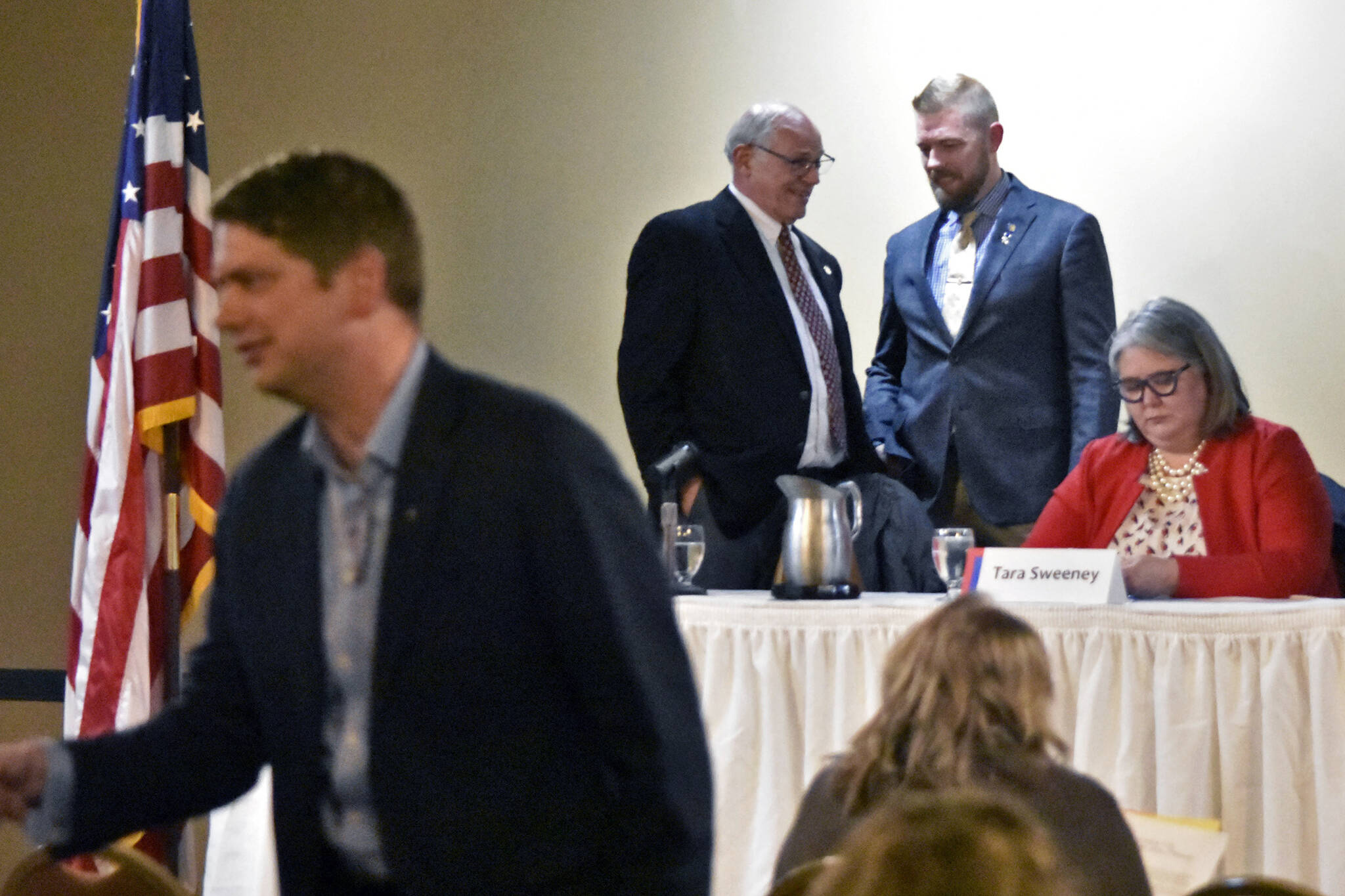Four Republican contenders for Alaska’s seat in the U.S. House of Representatives pitched themselves to Juneauites Tuesday evening, during a forum held at the recently reopened Baranof Hotel.
Tara Sweeney, John Coghill, Nick Begich III and state Sen. Josh Revak, R-Anchorage, took turns answering questions from Ben Brown, a member of the Capital City Republicans, who with Capital City Republican Women, hosted and organized the event. Dozens of people turned out to hear the candidates, with more arriving as the evening progressed.
Several of the questions centered around positions taken by Don Young, Alaska’s lone representative for 49 years, whose death in March in the middle of an election year opened a flood gate of candidates vying for his seat. There are currently 48 candidates in the special election to replace Young, and 20 who have filed in the regular November election as well, including all of Tuesday evening’s candidates. Candidates were each asked the same question, and given turns to answer with a one or two-minute time limit.
When asked, all four candidates said they would not have voted to impeach former President Donald Trump on the two occasions Young voted against impeachment and all said they would have voted to certify the results of the 2020 elections, but each said trust in elections had been eroded and stressed the importance of election security.
“There’s a bipartisan crisis of confidence in elections,” Begich said.
Revak said he had concerns but said elections are a state issue.
[Update: Budget to be shaped by committee as session nears end]
“Elections are a state issue,” Revak said. “I wasn’t in these other states, (Alaska) had a recount, we didn’t see the results where there’s election fraud.”
Other states had also done recounts, Revak said, noting the recount that took place in Arizona failed to find any evidence of widespread election fraud, prompting a “that’s not true,” from one audience member.
The Associated Press reported in Sept. 2021, the firm hired by Republican lawmakers to conduct a recount of Arizona’s 2020 presidential election — Cyber Ninjas — acknowledged in its report that there were “no substantial differences” between the group’s hand count of ballots and the official count.
The three male candidates all affirmed their anti-abortion credentials and praised the leaked draft decision written by U.S. Supreme Court Justice Samuel Alito suggesting the federal decision protecting the right to abortion — 1973’s Roe v. Wade — could be overturned.
“I believe the draft opinion is a sound constitutional decision,” Begich said.
Revak said as a believer in state’s rights he was pleased to see the issue put under state authority, and while affirming his anti-abortion stance, said there should be some exceptions when the life of the mother is threatened.
“I am for the life, however we can keep that life safe,” Coghill said.
Sweeney said she didn’t believe federal funds should be going to fund abortions, but said she didn’t think the federal government should be able to tell women what they could do with their bodies, saying she also didn’t support mask or vaccine mandates.
“As the only woman on this stage I take a libertarian approach,” Sweeney said. “The federal government has no role in telling a woman what to do with her reproductive health.”
Only Begich said he wouldn’t have voted to support the recent bipartisan infrastructure law passed by Congress.
“I believe that this bill was packed full of Green New Deal (programs),” Begich said.
The Infrastructure, Investment and Jobs Act, also know as the bipartisan infrastructure law, will spend over $1 trillion nationwide, mostly in competitive grants for infrastructure projects. That bill was negotiated by a partisan group of U.S. Senators, including Sen. Lisa Murkowski, R-Alaska, who was able to secure several provisions favorable to Alaska, such as funding for ferry service in rural areas.
Coghill said there were many things in the bill he didn’t like — an unfortunate reality of politics, he said — but he believed the bill would bring good things to Alaska. Revak noted that the few Republicans, including Young, who did vote for the bill were able to exercise more influence over its contents.
“Coming from rural Alaska without running water and flush toilets, this is a chance to allow Alaskans to realize a different opportunity through connectivity,” Sweeney said, referencing funding in the bill for broadband internet.
Candidates spoke well of former President Donald Trump and his policies — Sweeney was appointed assistant secretary of the Bureau of Indian Affairs by Trump in 2018 — though Coghill noted the former president’s manner, “sometimes drove me crazy.” Trump has endorsed former Gov. Sarah Palin in the race for Young’s seat. Palin was listed as an invited candidate in the event’s advertising but wasn’t present at the debate.
• Contact reporter Peter Segall at psegall@juneauempire.com. Follow him on Twitter at @SegallJnuEmpire.

